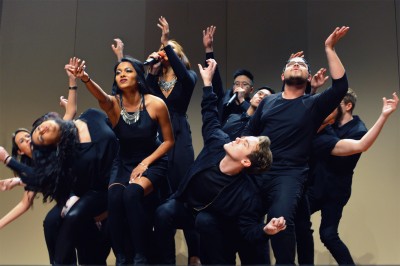
The International Championship of Collegiate a cappella held its first competition in 1996, according to the Varsity Vocals website, but the group-singing phenomenon has only recently gained widespread popularity due to the release of a cappella-focused films and television shows. Now, more than 450 groups from the United States and Europe compete in the ICCA every year.
Boston University a cappella groups swept the award categories Saturday at the ICCA Northeast Quarterfinal in the Tsai Performance Center. The Treblemakers, the BosTones and The Dear Abbeys placed first, second and third, respectively.
Jordy Shulman and Haley Castuera of the Treblemakers won the Outstanding Soloist awards. Jeff Leong of the BosTones won Outstanding Vocal Percussion. Castuera and Kayla Pichichero of the Treblemakers won Outstanding Choreography.
Luke Daly, a freshman in the College of Arts and Sciences and the president of the Treblemakers, described winning the Quarterfinal as “one of the craziest moments of [his] life.” The Treblemakers did not even compete in the ICCA last year.
“Going into something like that, you don’t want to expect anything, but we put our hearts into the set and really cared about it, so I think we all knew if we put it all out there on the stage, we could do well,” Daly said.
Nicholas Griggs-Drane, a senior in the College of Communication and the president of The Dear Abbeys, said he is proud of all the BU groups. He said that the criteria for judging were strict, and he was happy that the Treblemakers and The Dear Abbeys were able to “stay true to themselves.”
“[The Treblemakers] totally deserve that win,” Griggs-Drane said. “[The judges] said that our energy was high, we were consistent among all the members of the group, we told our story and we stayed true to being the Abbeys. That was our goal, to keep our name out on stage with us, and I think we did that really well.”
The groups were judged based on their vocal and visual performances, so they had to incorporate choreography into their sets, which could have been challenging for groups who usually just sing.
“Imagine trying to coordinate 11 baboons,” Griggs-Drane said. “We’re not dancers, we’re musicians, so it was a challenge, but it’s fun.”
The Treblemakers had six-hour choreography rehearsals on the weekends leading up to the competition, Daly said. Their slow-motion transitions in between every song pleased the judges, who gave them the Outstanding Choreography award.
“This year, the choreographers and our music directors really focused on making our set a story, playing a little bit more into the theater aspect of it,” Daly said. “All the songs connected to one another to make this story of nostalgia that we were trying to establish, and I think it translated.”
David Rabizadeh, director of the ICCA, said the level of competition has changed dramatically over the last 15 years, leading to bigger venues and impressive musicality and choreography.
“Every single year, they’re upping their game,” Rabizadeh said. “The groups change dramatically, and they learn from each other.”
Diana Galeano, producer for ICCA Northeast Quarterfinals and the Semifinal, agreed that a cappella has changed a lot in recent history.
“We’ve seen a huge growth over the last five years, especially with a cappella being much more mainstream thanks to ‘The Sing-Off,’ Pentatonix, ‘Pitch Perfect,’ ‘Sing It On,’” Galeano wrote in an email. “We anticipate more and more groups applying to compete over the course of the next few years.”
Galeano and Rabizadeh both said that although they can count on a couple a cappella groups to advance to the finals each year, there are always some surprises, depending on how groups react to member turnovers. The groups that do the best in the ICCA competitions, Rabizadeh said, are “consistent” throughout their whole sets.
“They’re the most committed,” he said, “and you can see it onstage in their performance and in their sound.”



















































































































